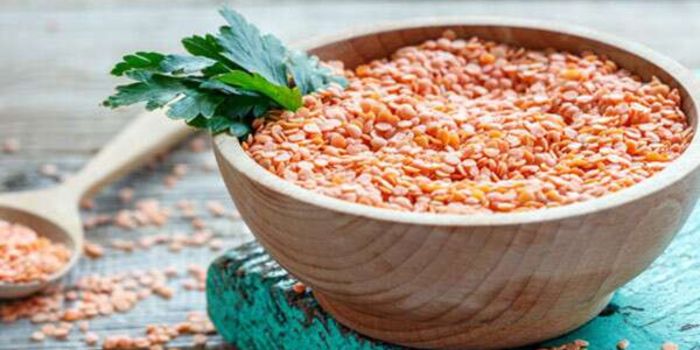Lentils Benefits, Nutrition Value, Health, and How to Cook Them
Nov 27, 2023 By Nancy Miller
Lentils are small, gluten-free edible seeds of the legume family, which are a rich source of B vitamins, folate, iron, potassium, a significant amount of fiber, and proteins. They are without the fat or cholesterol of red meat, which prevents you from many cardiovascular diseases.
Lentils are easy to cook; unlike many other dry beans, you don't have to soak them before cooking. Moreover, their low cost makes them an excellent choice for getting high-quality protein for many people around different regions of the world.
This article will discuss everything about Lentils benefits and side effects, their nutritional facts, and how to cook them properly.

Types of Lentils (Brown, Puy, Green, Yellow, Red, and Beluga)
Lentils have different categories based on their color. Following are some of the common lentil types.
- Brown: The most widely eaten type, it has an earthy flavor, holds its shape during cooking, and is used in stews and soups.
- Green: Vary in size, less expensive than others, substitute for Puy lentils.
- Yellow and Red: They Split and cook quickly, are great for making dal, and have a sweet and nutty flavor.
- Beluga: Tiny black lentils that look like caviar, great for making the base for warm salads.
- Puy: Native to the French region Le Puy, similar to green lentils in color but are about one–third of their size and have a peppery taste.
Nutritional Benefits of Lentils
Lentils are often overlooked, even though they are a highly nutritious food. They are richly embedded with vitamins, minerals, proteins, polyphenols, and fibers.
While they are a rich source of protein and fiber, the presence of polyphenols in them is becoming a hot topic of research because polyphenols play a crucial role in preventing degenerative diseases.
To check their nutritive value, researchers show that 100 grams of cooked lentils provide:
- 116 kcal of energy
- 9.02 grams of proteins
- 0.38 grams of fats
- 20.13 grams of carbs, including 7.9 grams of fiber and 1.8 grams of sugar
Red lentils benefits are also a rich source of the following essential nutrients:
- Folate
- Manganese
- Phosphorous
- Iron
- Thiamin
- Potassium
- Vitamin B6
- Moreover, lentils also contain:
- Riboflavin
- Niacin
- Pantothenic Acid
- Zinc
- Magnesium
- Copper
- Selenium
The above stats show the nutritious value of lentils. All these essential nutrients provide many health benefits, discussed below in detail.
Proven Health Benefits of Lentils
Supplementing your diet with lentils provides the following key benefits:
Rich Source of Filling Fiber:
Lentils are a rich source of both insoluble and soluble fiber, which makes you full by expanding in the stomach and absorbing water.
In addition, research shows that fibers coming from consuming legumes improve heart, metabolic, digestive, and immune function by removing excess fat and toxins from the body.
Improve Heart Health:
Lentils are a rich source of fiber, folic acid, and minerals like potassium, which support heart health. Research shows that fiber intake also reduces cholesterol levels in the body, which is a major factor for cardiovascular diseases. Therefore, when people use lentils in their diet, they decrease their risk of heart disease.
Improve Digestive Health:

Lentils with high levels of dietary fiber promote regular bowel movements. High levels of insoluble fiber increase water absorption in the digestive tract, swell up and remove the waste of the digestive tract.
This way, lentil intake helps prevent constipation, symptoms associated with IBS, inflammatory bowel diseases, diverticulitis, and even diarrhea.
Regulate Blood Sugar Levels:
According to research, high levels of soluble fibers in legumes trap glucose from carbs and lower digestion. This way, lentil intake helps stabilize blood sugar levels, preventing energy dips, mood swings, and serious conditions such as diabetes, insulin resistance, or hypoglycemia.
Rich Source of Plant-Based Proteins:
Lentils are an important source of plant-based proteins as they have the third-highest protein level by weight of any legume or nut. Their single cup serves 18 grams of protein, equivalent to eating about three whole eggs. This way, replacing meat with them in your diet will provide the benefits of lentils for weight loss.
Help During Pregnancy:
Lentils contain a significant amount of folate, which is necessary for preventing neural tube defects during pregnancy. Moreover, this essential vitamin also reduces the risk of gestational diabetes. Therefore, childbearing women should intake folate during pregnancy.
Provide Immune Support:
Lentils also contain Selenium, which suppresses the rate of tumor formation. Selenium also improves a person's immune response to infection by promoting the production of T lymphocytes. Moreover, Selenium also reduces colorectal, prostate, lung, bladder, skin, esophageal, and gastric cancer rates.
How to Cook Lentils Properly?
Lentils are quick and easy to cook. Unlike many other dry beans, you don't have to soak them before cooking. Just rinse them before cooking to remove dirt or debris. Remove lentils that look rotten or damaged.
You can buy lentils with or without their husk, or you can also choose canned lentils.
Different lentil types have different cooking times. For example, red lentils can easily cook within 5 minutes, while other types may need 20-30 minutes.
So, to cook them properly, put them in a pot filled with water and start boiling them. Lower the heat and simmer them. Keep them checking and add water, if necessary.
Are Lentils Good For Your Gut
Sometimes, eating too many lentils or undercooked lentils may cause some health issues. Like fruits and vegetables, lentils are rich in fibers that are difficult to break down. Though it also promotes the production of good bacteria, too much consumption can cause cramping and gas. Therefore, to reduce these symptoms, don't eat too many lentils at once; rather, gradually increase fiber intake.

Final Thoughts
Lentils are versatile, richly textured edible legumes, including green, yellow, red, or black lentils, which are an excellent source of folate, polyphenols, B vitamins, proteins, and fibers.
Their high protein content and other nutrients provide many lentils benefits, including improving heart health, regulating blood sugar levels, synthesis of red blood cells, regulating bowel movement in the digestive tract, and others.
Lentils are easy to cook; you don't have to soak them before cooking. Usually, they require 5-30 minutes to cook properly.
-
 Oct 17, 2023
Oct 17, 2023What are the benefits of Fish Oil for Hair and How to Use It
Applying fish oil supplements to the scalp can benefit hair growth. The oil prevents hair loss, increases hair thickness, and makes them shiny
-
 Jan 07, 2023
Jan 07, 2023How Can You Tell If You Have A Stomach Ulcer?
An ulcer forms in the stomach or small intestine lining, causing pain and discomfort. Abdominal discomfort, nausea, vomiting, bloating, loss of appetite, and heartburn are all symptoms. Bleeding is a potentially fatal complication of a stomach ulcer. Going to a doctor for a diagnosis and treatment is essential if you think you have a stomach ulcer.
-
 Sep 26, 2023
Sep 26, 2023Can Sugar Cause Kidney Stones? Find Out!
Do you know added that sugar can cause kidney stones? Find out more about this recent study and take appropriate measures.
-
 Nov 27, 2023
Nov 27, 2023A Possible Reasons For Always Feeling Tired And Their Impacts
Are you tired of feeling lazy and fatigued all day? Let’s find out the possible reasons for your tiredness.
